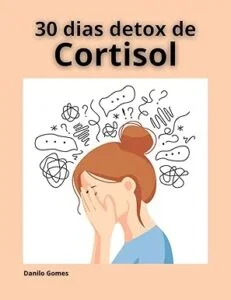Cortisol: What it is and how to keep it under control

|
Getting your Trinity Audio player ready...
|
Have you ever heard of the stress hormoneYes, we're talking about cortisol. This hormone, essential for survival, plays a crucial role in regulating several bodily functions, such as metabolism, inflammatory response, and even memory. However, when dysregulated, it can be a real enemy to your health.
But how do you know if your cortisol levels are out of balance? And more importantly, how can you regulate this hormone to avoid physical and emotional problems? In this article, we'll explore all about cortisol and share effective strategies to keep it under control.
What is cortisol?
THE cortisol is a hormone produced by the adrenal glands, located above the kidneys. It plays a key role in the response to stress, helping the body deal with dangerous or stressful situations. Therefore, it is often called “stress hormone”.
Cortisol production is regulated by the hypothalamic-pituitary-adrenal (HPA) axis, a system that adjusts hormone release according to the body's needs. Thus, in stressful situations, the brain signals the adrenal glands to release more cortisol, preparing the body to react.
The problem occurs when cortisol levels remain high for too long, which can lead to symptoms such as fatigue, weight gain, anxiety and difficulty sleeping. On the other hand, low cortisol levels can also cause problems such as extreme weakness, dizziness, and difficulty coping with stress.
Therefore, maintaining a healthy cortisol balance is essential for the proper functioning of the body and mind.
The impact of cortisol on health
Benefits of cortisol at balanced levels
Although considered the stress hormone, cortisol isn't just linked to stress. It has several important functions in the body, including:
- Regulation of metabolism: Thus, it helps in converting proteins, fats and carbohydrates into energy.
- Inflammation control: Reduces inflammatory processes and aids healing.
- Immune function: Modulates the immune system response.
- Blood pressure regulation: It acts to maintain adequate blood pressure.
- Influence on sleep and mood: Therefore, balanced cortisol levels are essential for restful sleep and emotional well-being.
Consequences of excess cortisol
Now, imagine this hormone being produced in excess for long periods. Chronic stress causes the body to continually release cortisol, resulting in:
- Weight gain, especially in the abdominal area.
- Insomnia and difficulty relaxing.
- Weakening of the immune system.
- Cardiovascular problems, such as increased blood pressure.
- Decreased muscle mass.
Problems caused by cortisol deficiency
On the other hand, low cortisol levels can also be harmful, causing:
- Extreme fatigue.
- Low blood pressure.
- Dizziness and fainting.
- Difficulty dealing with stress.
Factors that influence cortisol levels
Chronic stress and its influence
Ongoing stress is one of the main causes of increased cortisol levels. Excessive work, financial problems, and even excessive consumption of negative information can keep the body in a constant state of alert.
Sleep quality and the role of circadian rhythm
Our body follows a biological clock, and cortisol respects this cycle. Thus, it peaks in the morning, helping us wake up, and decreases throughout the day. However, poor sleep or frequent time changes can disrupt this production, raising cortisol at inappropriate times.
Nutrition and its relationship with hormone production
Excessive consumption of sugar, caffeine, and ultra-processed foods can stimulate the release of cortisol. Conversely, a balanced, nutrient-rich diet helps regulate hormone levels.
Physical exercise: allies or villains?
Moderate physical activity helps reduce stress and balance cortisol levels. However, excessively intense workouts without adequate rest can have the opposite effect, raising hormone levels and hindering muscle recovery.
Signs and symptoms of cortisol imbalance
Cortisol imbalance can affect various bodily functions, causing physical, emotional, and metabolic symptoms. Thus, symptoms vary depending on whether levels are high or low.
Signs and symptoms of high cortisol (hypercortisolism)
When the body produces excess cortisol, whether due to chronic stress or other factors, symptoms such as:
- Weight gain, especially in the abdominal area
- Insomnia or difficulty sleeping (the body remains in a state of alert)
- Anxiety, irritability and frequent mood swings
- High blood pressure and increased risk of cardiovascular problems
- Decreased immunity, making the person more vulnerable to infections
- Constant fatigue, even after a proper night's sleep
- Difficulty concentrating and memory lapses
- Hormonal imbalance, which can affect menstruation in women
- Loss of muscle mass and weakening of bones (increased risk of osteoporosis)
- Appearance of acne and oily skin due to impact on hormonal balance
In conclusion, if this condition persists, it can lead to Cushing's Syndrome, a serious condition associated with excess cortisol in the body.
Signs and symptoms of low cortisol (hypocortisolism)
On the other hand, when cortisol levels are too low, the body may have difficulty coping with stress and maintaining essential functions. Common symptoms include:
- Extreme fatigue and feeling of constant tiredness
- Difficulty waking up and low energy throughout the day
- Drop in blood pressure, which can cause dizziness and fainting
- Muscle weakness and difficulty performing daily activities
- Muscle and joint pain for no apparent reason
- Low resistance to stress, leading to anxiety attacks or lack of motivation
- Intense craving for salty foods (due to electrolyte dysregulation)
- Depression and discouragement, for no apparent reason
- Loss of appetite and unexpected weight loss
If low cortisol is left untreated, it can progress to adrenal insufficiency (or Addison's disease), a serious condition that requires medical attention.
How to Reduce and Balance Cortisol Naturally
Practices of mindfulness and meditation
Studies show that just a few minutes of mindful breathing a day can make all the difference. Thus, meditation and mindfulness help calm the mind and reduce the stress response by lowering cortisol levels.
Physical activity in the right measure
To practice moderate exercise, such as walking and yoga, helps balance cortisol levels without causing excessive spikes. Therefore, the key is regularity and adequate intensity.
Eating strategies for cortisol control
To keep cortisol under control, invest in foods rich in:
- Magnesium (avocado, banana, nuts)
- Omega-3 (salmon, chia, flaxseed)
- Tryptophan (cocoa, eggs, cheese)
These nutrients help regulate hormone production and promote a sense of well-being.
Quality sleep as a hormonal regulator
Creating a healthy nighttime routine, avoiding screen time before bed, and maintaining a regular sleep schedule is essential for maintaining hormonal balance.
The importance of breathing and relaxation
Techniques such as diaphragmatic breathing help activate the parasympathetic nervous system, reducing stress and promoting relaxation.
In short…
Cortisol plays an essential role in our bodies, but an imbalance can lead to serious health problems. Therefore, small changes in your routine, such as meditation, moderate exercise, and a balanced diet, can make all the difference in controlling this hormone.
If you feel like your stress is out of control, start adopting healthier habits today. Your body and mind will thank you!
Recommended Reading:

30-Day Cortisol Detox – Danilo Gomes (Author)
Image: Freepik

Marcel Castilho is an expert in neuromarketing, neuroscience, mindfulness and positive psychology. In addition to being an advertiser, he also has a Master's degree in NLP – Neurolinguistic Programming. As the owner and founder of the communications agency VeroCom and also of the digital agency Vero Contents, he has been studying human behavior for over 30 years.


